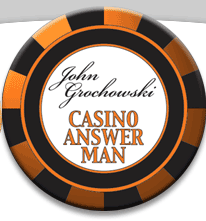Question. I never see much written about video keno,
but that's just about all my husband and I play. I was wondering if you
could solve a question for us. My husband says that it doesn't matter
what numbers you pick, that when the machine's ready to pay off, it'll
pay off. You just have to be in the right place in the right time, just
like a slot machine.
Don't the numbers matter at all?
Answer. The numbers you pick do matter. Video keno
machines have random number generators, just like any slot machine. But
the video keno RNGs are just generating the numbers to be drawn, and if
your numbers match the RNG's, you win. You can't win if you don't have
the numbers that are drawn on that play.
Every number has an equal chance of being selected. In the basic game
with 80 numbers, and 20 drawn per play, each number has a 1 in 4 chance
of being among those 20.
The house doesn't get its edge on video keno from making sure there
are more losers than winners. It gets its edge from paying less than
true odds when you do win. Let's use the simplest example: A one-spot
play.
Your number has a 1 in 4 chance of being drawn. If video keno were
an even game, your winner would pay 3-1 odds --- in an average four
plays, you'd lose three times, but get back all four wagers on the one
time your number hit. But most machines that allow one-spots give back
only three coins on the winner. The coin you don't get paid is the house
edge.
Meanwhile, the random number generator just keeps generating numbers
to be drawn. For you to win, your numbers have to match the machine's.
Your selections do matter.
Question. I hit a slot jackpot for $12,500 on a dollar machine. I usually play quarters, so
this is by far the largest I ever hit.
The attendant and security guard were very nice, and happy for me. We
had high fives all around. They had me sign a tax form. Then the
attendant turned a key in the machine before I could play again.
My question is, what does that key do? The man next to me says its
resets the machine into "collect" mode, that the machine has just paid
out and now it has to take money for a while.
Answer. Congratulations on your big hit. A reason for high fives all around indeed.
As for resetting to "collect" mode, well, no. There is no "collect"
or "payback" mode on slot machines. Results remain as random as humans
can program a computer to be. And at least until server-based games
arrive, changing a payback percentage requires opening the machine and
changing a computer chip, not just turning a key or punching in a code.
What the attendant is really doing is unlocking the game so you can
play again. The game locks up automatically when an IRS-level jackpot of
$1,200 or more is hit. The casino unlocks it once it has your ID and information. Then it has to have you sign the form before it can pay you.
Big jackpots are a normal part of play, and are included in the
calculations for the game program. The machine just keeps making its
random payoffs, and in time, the jackpot fades into statistical
insignificance.
Question. I've studied blackjack basic strategy, so I
know when to double down. But when I was playing with a friend of mine recently, he was
doubling down on 8s, too. I asked him about it afterward, and he said it
was because it was at a single-deck game. Is that right? Why the
difference?
Answer. Single-deck blackjack does bring with it
some basic strategy changes, and one of them comes when you have a
two-card 8. In the single-deck game, you have an edge with an 8 when the
dealer shows a 5 or 6, and you want to double down.
Why the difference? Because each card removed from a single-deck game
has a greater impact on the composition of the remaining deck than it
does in a multiple-deck game. In a single-deck game, taking your 5 and 3
and the dealer's 6 out of a 52-card deck means that 16 of the other 49
cards, or 32.7 percent, are 10 values, and 10-value cards are the
dealer's enemy when he or she has a 6 up. In a six-deck game, removing
those three cards from play would mean that 96 of the other 309 cards
are 10 values, and that's just 31.1 percent.
The dealer in that situation will bust more frequently in a
single-deck game than in a multiple-deck game, and that affects our
strategy. In addition to the dealer being more likely to bust than in a
multiple-deck game, you're more likely to draw a 10-value card on top of
your 8. That 18 isn't all-powerful, but it's pretty strong against a 5
or 6.

This comment has been removed by a blog administrator.
ReplyDelete